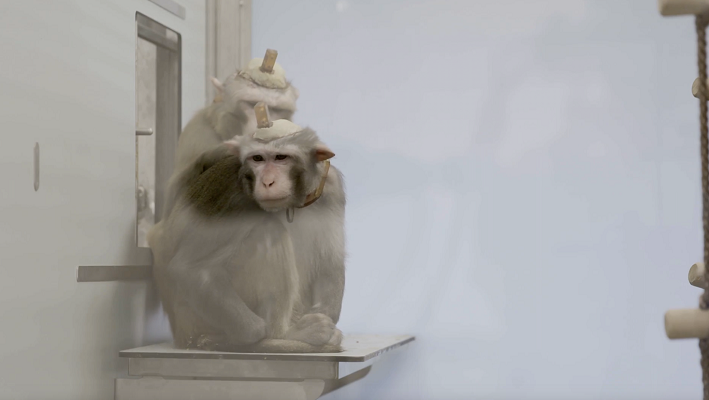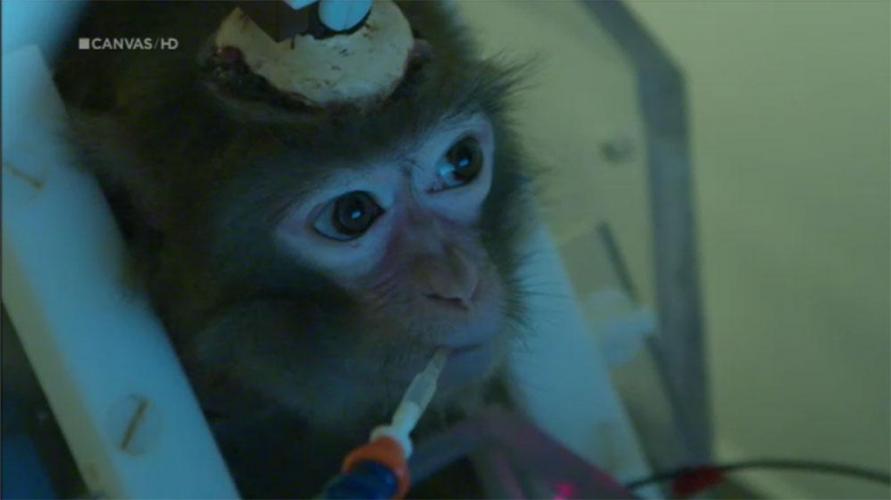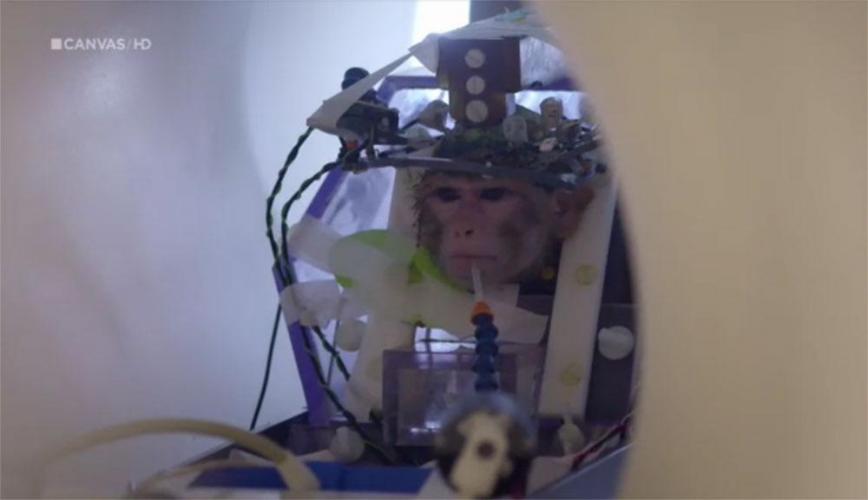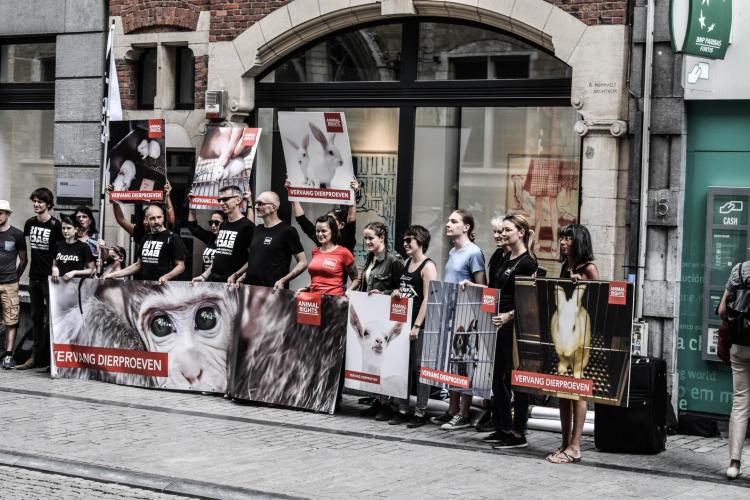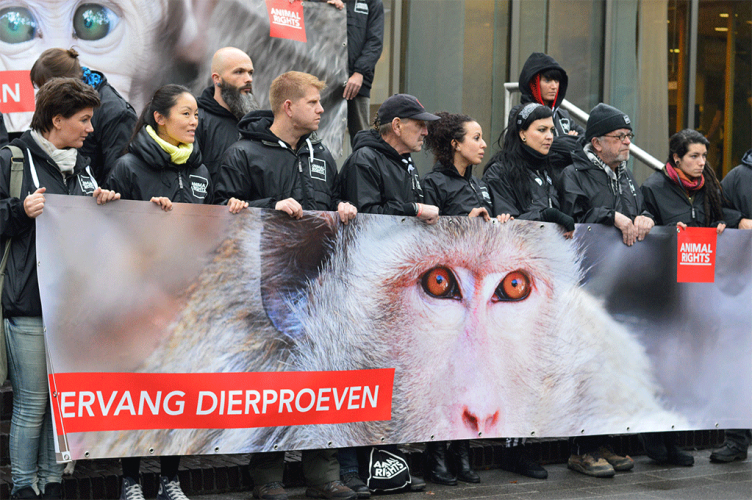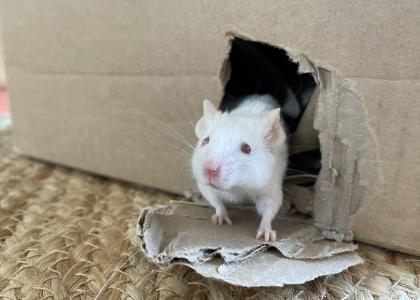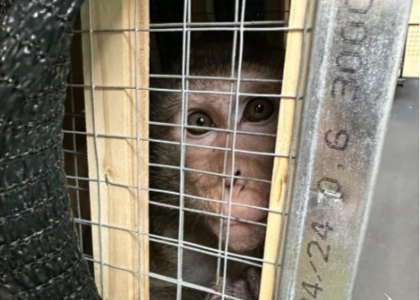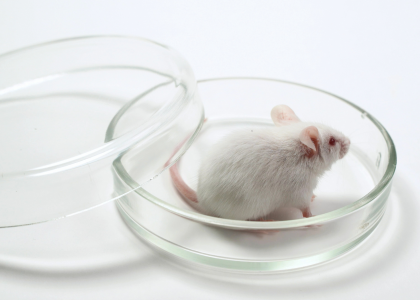Inhoud
Shocking: Flemish government wastes millions of taxpayers' money on the KU Leuven to kill monkeys
The Flemish government has allocated no less than 1,828,610 euros, in 2019 alone, to the KU Leuven to finance brain experiments on monkeys. Animal Rights is raising the alarm and is calling on the government to end subsidies for animal testing and to invest public funds for research into alternatives. Animal Rights launches a new petition to save the KU Leuven monkeys and organises a silent protest on 1 October to end all monkey testing at the KU Leuven.
Our taxpayers' money is being wasted on cruel animal experiments that the majority of the population wants to see banned.
More subsidies for cruel animal testing than for alternatives
In Flanders, Minister Weyts allocated a one-off sum of 350,000 euros in 2017 for the research into alternatives.1 At the same time, the Flemish government allocates millions of euros annually for the funding of animal testing. Research by Animal Rights shows that in 2019 alone, animal experimenters from the KU Leuven received a 1,828,610 million euro subsidy from the government via the FWO (Research Foundation – Flanders) to carry out experiments on 12 rhesus monkeys.23 In addition, several other long-term monkey experiments, most of which are subsidised by the government, will continue unhindered at the KU Leuven.4 At the end of the journey, almost all the experimental animals will be killed.
In an opinion poll on animal experiments, a large majority of Belgians state that experiments on monkeys (79%), as well as on all other animals (64%), should be banned.5 Toxicologist and campaign coordinator Jen Hochmuth reacts outraged: "Our tax money is being wasted on cruel animal experiments that the majority of the population wants to see banned. Animal Rights has previously uncovered that one million euros was approved via FWO in 2017 for controversial monkey experiments at KU Leuven. "Through government bodies like the FWO, Flemish universities are given full freedom to decide for themselves on which research projects public budgets are spent on", says Hochmuth.
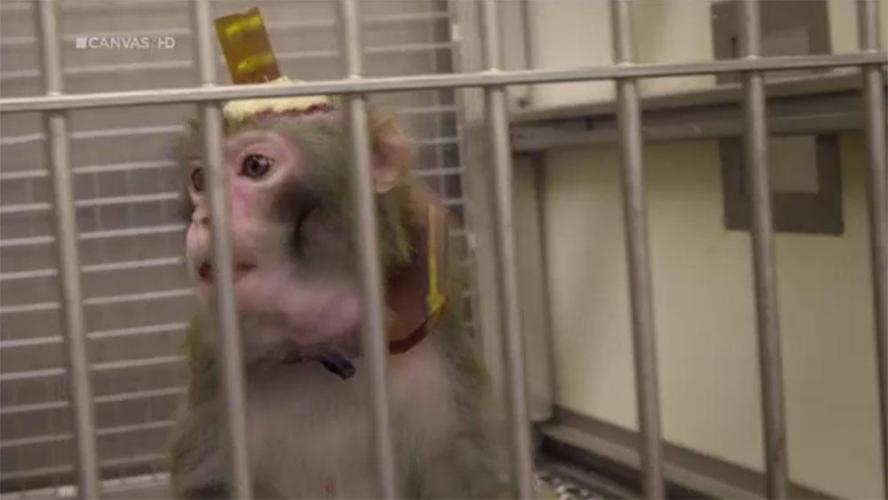
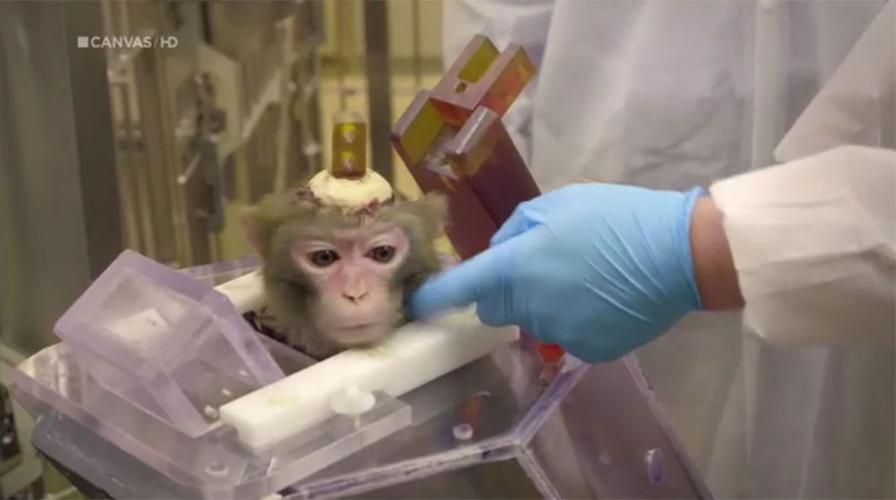
Brain experiments cause the monkeys a lot of suffering.
The brain experiments cause the monkeys a lot of suffering. In order to be able to measure their brain activity, all test monkeys are made 'ready for use'. Electrodes are implanted into the brain via boreholes in their skulls. Cement is used to attach a fixation rod or 'hat' to the skull. This rod serves to fix the head of the monkeys during later brain measurements. The animals have to go through heavy training programmes for months and are put on strict water diets to force them to cooperate with the researchers.In the meantime, KU Leuven has been conducting gruesome experiments on monkeys that cause a great deal of suffering for more than 30 years. Previous media attention, revealing that the KU Leuven was conducting cocaine experiments, sparked a storm of international protest.
Information from the Flemish government shows that 3 new animal testing projects on rhesus monkeys have been started in 2020 at the KU Leuven.1 Over the next 4 years, no less than 12 rhesus monkeys will undergo major brain operations in which electrodes are implanted in their brains and are withheld water to force them to cooperate with the experimenters.
At KU Leuven animal experimenters claim that "it is not ethically justifiable to plant electrodes in normal human subjects. In monkeys, that is justifiable". 2 This shows that animal experimenters have double standards. If you ask the experimenter why they use animals it is because they are like us, but if you ask why we are allowed to test on animals, the researcher says because they are not like us" (quote from Charles R. Magel).
These animal experiments are not legally required for the development of new medicines. They are useless and cruel experiments that only serve to satisfy the curiosity of scientists lacking compassion.
Testing on monkeys not only immoral but scientifically useless
According to the experimenters at the KU Leuven, experiments on monkeys are justified because they provide us with new insights into human brain functioning. In this way, the KU Leuven aims to develop effective medicines or treatments for humans. In these experiments, monkeys are used as a model for facial recognition in humans but it is scientifically proven that rhesus monkeys are not a suitable model of human individual facial recognition. 1
According to Hochmuth, these experiments are not only morally unacceptable but also completely useless from a scientific point of view: 'These animal experiments are not legally required for the development of new medicines. They are useless and cruel experiments that only serve to satisfy the curiosity of scientists lacking compassion', she emphasises.
According to Animal Rights, this is also a violation of the European directive on the protection of animals used for scientific purposes.2 Article 12 prescribes that animal testing may only be considered if an alternative to animal testing is not available. Scientists have already carried out numerous measurements on humans, which, unlike experimental animals, can give their consent. 3
The brain experiments on monkeys are not a necessary evil but plain evil!
SIGN THE PETITION: SAVE THE KU LEUVEN MONKEYS!
Animal Rights demands the release of all the test monkeys locked up in the laboratory animal centre of the KU Leuven. More than forty monkeys are currently confined in the KU Leuven laboratory animal centre. The animals are (re)used at KU Leuven for an average of 7 to 10 years. Some monkeys undergo several brain surgeries during this long period to replace loose or damaged implants or rods. These animals deserve a dignified pension in a specialised shelter.
Animal Rights demands an end to government support for all monkey testing at the KU Leuven. "The brain experiments on monkeys are not a necessary evil but plain evil," says Hochmuth.
Sign the petition: Save KU Leuven monkeys!
English translation of the Dutch petition
TEKEN NU DE PETITE = SIGN THE PETITION NOW
Voornaam = First name
Achternaam = Last name
Geboortedatum = Date of birth
E-mailadres = Email address
Woonplaats = Place of residence
Land ('Nederland', 'België', of 'Andere') = Country ('The Netherlands', 'Belgium', or 'Other')
Telefoonnummer = Telephone number
Ja, ik ontvang graag de digitale nieuwsbrief = Yes, I would like to receive the digital newsletter (in Dutch ONLY)
We gaan vertrouwelijk met jow gegevens om (verplicht aan te vinken). = We will keep your details confidential (mandatory tick).
Teken de petitie (hierop klikken) = Sign the petition (click on it)
Demonstration at KU Leuven: Stop animal testing on monkeys!
Animal Rights is fundamentally opposed to all animal testing. If we do not want to use humans as objects of experimentation without their consent, then this applies universally to all living beings. Every animal is an individual with a right to life and welfare, regardless of usefulness or necessity to humans.
On Thursday 1 October, Animal Rights, together with Bite Back, will organise a silent and peaceful protest at the entrance to the rectorate of KU Leuven.
We would like to draw attention to the more than 40 monkeys currently sitting in the laboratory animal centre of KU Leuven.
Animal Rights therefore demands that the government stop funding all monkey experiments. We demand that research budgets be invested in the development of alternative methods worthy of a civilised society.
